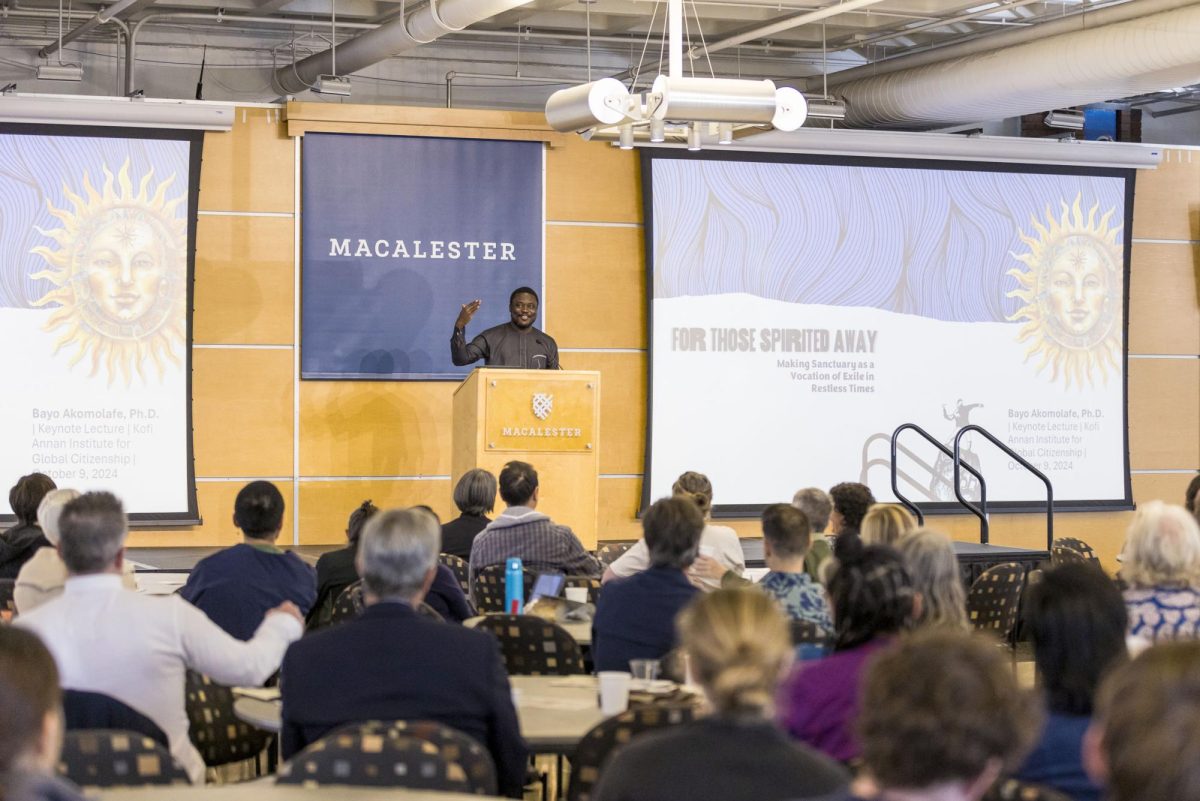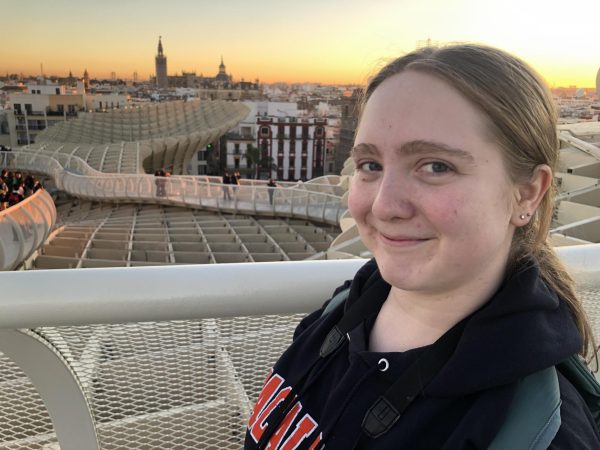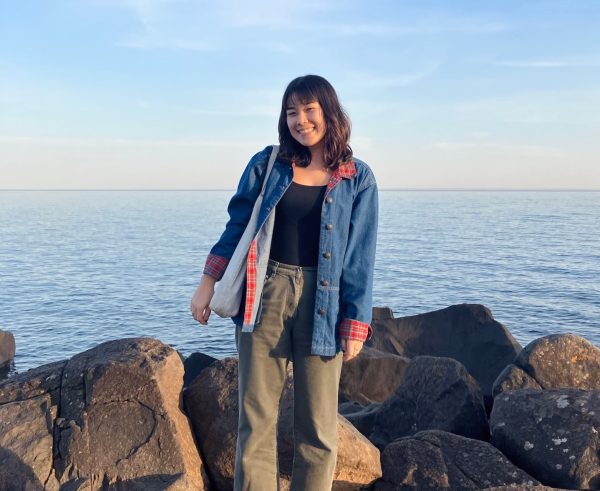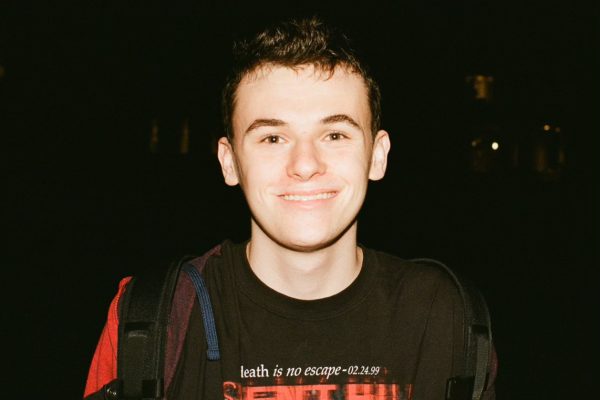From Oct. 9-11, Macalester hosted its 31st International Roundtable (IRT) — an event organized through the Kofi Annan Institute for Global Citizenship each October, which brings community members together to engage in critical dialogue around a chosen theme. This year’s campus-wide forum, “Slowing Down, Seeking Roots, Making Sanctuary: Belonging Beyond the Anthropocene,” featured four plenary speakers and eight student-led sessions.
On the evening of Wednesday, Oct. 9, the event opened with a keynote address delivered by philosopher, professor, author and chief curator for the Emergence Network Dr. Bayo Akomolafe. Akomolafe’s presentation, entitled “For Those Spirited Away: Making Sanctuary as a Vocation of Exile in Restless Times,” focused on coexisting temporalities and the history and shaping of exile.
Outlining the theme of punctuality, Akomolafe introduced the questions at the center of his discussion: “What does it mean to be on time, in a time, out of time? What does it mean to be on time when we’re already out of time? … What time are we talking about? Which time are we contributing to?”
Akomolafe expanded upon this preliminary interrogation of time, explaining that although some people may think about a “modern, linear, neurotypical [temporality]” in which everything occurs, there exist different understandings of time as “strange” and “disruptive.” He also described the possibility of multiple temporalities and times engaged at a given point and how urgency “can become carceral,” posing the risk of “becoming imprisoned in a way of being in the world that is increasingly subsidized and increasingly exhausted.”
Transitioning to more closely examining the question of finding sanctuary in moments marked by pain and suffering, Akomolafe shared that a friend once asked him what he considered to be “the story of these times” given everything happening in the world. His answer was “embarkation,” pointing to Africans being forcibly escorted onto ships and brought to the Americas and sharing the story of Esu, a figure of embarkation in Yoruba spirituality.
‘Anemopoetics’ — a term coined by Akomolafe, which refers to “how winds, in their emergence, shape and are shaped by material worlds” — was an additional focus of his speech, particularly in thinking about the transatlantic slave trade.
“Winds are bearers of trauma, memory and loss,” Akomolafe said. “In a sense, we live in a wind-shaped world that makes sense, not just from a human-centric perspective, but a world that does things. This is how I think about exile — that the wind is the carrier of exile that blows through white modernity, and this wind is a strange vocation. It animates every project of settlement.”
Following, Akomolafe utilized writer Edouard Glissant’s text “The Open Boat” to articulate the ‘parapolitics of making sanctuary’ through the ‘three unknowns:’ the belly of the ship, the depths of the sea and the unknown land.
To close out his discussion, Akomolafe returned to the initial question of what it means to make sanctuary. When his seven-year-old son, who is autistic, experiences sensory overload, his wife does not try to “fix” or “rehabilitate” him. Instead, she chooses to simply lay with her son and hold his hand for comfort.
“I remember thinking to myself ‘that’s what I’ve been talking about, that’s making sanctuary,’” Akomolafe said. “It’s just emerged from that small encounter with … something that doesn’t fit in the room. Holding space for that was making sanctuary.
“It was monstrous in its emergence, but something about that disrupts our neurotypicality and enables us to be in other kinds of perceptual walls with other temporalities and times and subjectivities. That’s why I want to end with an invitation to say ‘let’s keep making room.’ We need room. … We need fugitive modes of perception, and I think ‘the monster’ is here to help us do that.”
The next day of programming began with a keynote titled “Solidarity Programs in the Anthropocene,” in which professor of media & cultural studies John Kim discussed his work with the Mississippi River Open School for Kinship and Exchange. The Open School is an educational initiative which, through hands-on learning and partnerships with local organizations across the Mississippi, teaches students about nature, Indigenous American cultures and what it means to be part of a community.
“The layered social richness and camaraderie of living and learning as part of a community is difficult to convey, partly because it’s felt,” Kim said, “but it’s at the heart of what I have inspired to integrate into my own teaching as much as possible, and directly relates to my use of the word ‘solidarity’ in the title of my talk.”
Kim spoke at length about the ‘River Semester,’ a study away program led by Augsburg University and supported by the Open School. Over the course of 100 days, the program takes students from the Mississippi’s headwaters in Minnesota to the Gulf of Mexico. Students must learn to cook, eat and sleep together, fostering a tightly-knit community of care. Students also get the opportunity to interact with local leaders and educators from various communities bordering the Mississippi. They might share a meal with Indigenous botanists in St. Louis, or converse with a New Orleans Lincoln Beach caretaker.
“A core aspect to this work has been partnerships with communities, many on the frontline of struggles against conditions associated with the Anthropocene, including resource extraction and climate change-related natural disaster response,” Kim said.
The Open School has also facilitated the formation of ‘action camps.’ These are small-scale educational programs designed to teach people about Indigenous practices of “care and living” through experiential learning. According to Kim, these programs were created “in collaboration with Native and non-Native educators, elders, artists, organizers and activists” and designed to be “open to the public and not exclusively for college and university students.”
Both River Semester and action camps are part of a larger project to reimagine the form and function of educational institutions.
“Can we think of ways to transform the university into a pedagogical environment that is open to the communities and camps that possess invaluable knowledge from which we wish to learn?” Kim asked the audience towards the end of his remarks. “How can universities support communities so that they can continue their necessary work?”
The IRT also saw a number of student-led sessions connecting to the Anthropocene and slowing down. One such session, “Sitting with the Prairie: Doing Nothing in Multispecies Community,” was led by Meira Smit ’25 and Joel Sadofsky ’25. They intended to reflect on their shared time on the River Semester, wherein the two student organizers joined Kim in sailing down the Mississippi River and their subsequent return to Macalester.
“Coming back to Macalester felt like a ‘recompression’ as opposed to a ‘decompression’ that was the semester,” Smit wrote in an email to The Mac Weekly. “We think a lot of other people, students and staff, feel this compression and unrelenting pace of the semester. An invitation to do nothing is radical, necessary, and should be commonplace.”
Some student facilitators returned to themes they had led a session on at last year’s IRT, under the theme of “Humanoids? Exploring the future of human freedom, ethics, knowledge and relationships.” Minori Kishi ’25 and Mathilda Barr ’25 led a session during that event “on precision agriculture technologies and their impact on food systems.” In this year’s IRT, Kishi and Barr worked to continue some of the conversations they had begun in that space.
“This year, we wanted to explore the other side of the spectrum by focusing on local food production, cultural traditions and sustainability,” Kishi wrote in an email to The Mac Weekly. “The opportunity to delve into how these elements can create pathways to ecological and cultural sanctuary was compelling. I aimed to highlight the importance of localized agricultural systems as an alternative to industrial agribusiness while bringing in community voices that inspire meaningful action.”
The focus was not solely on agriculture, however. As Damaris Zamora-Aguilon ’26 shared, speaking on her panel “Cultivating Identity and Empowerment: Celebrating Central American Culture and Building Sanctuary Spaces,” the IRT was also an opportunity to educate people on Afro-Indigenous communities, both in the U.S. and beyond.
“I was compelled to co-create an IRT session to help mobilize education and knowledge about Afro-Indigenous communities in Central America and the U.S.,” Zamora-Aguilon wrote in an email to The Mac Weekly. “I feel that there is a lot of lack of knowledge of these groups of people in the Latine community, and I wanted to spread awareness of the different ways that the Garífuna community organizes and builds sanctuary spaces in the country that has taken everything from them.” In a Mac Daily announcement on Monday, Oct. 21, Dean of the IGC Hui Wilcox shared that, “in keeping with the idea of ‘slow curation,’” the 32nd IRT in 2025 will continue with this year’s theme.
Scarlet Dunning and Gabby Simpson contributed to the reporting for this story.















